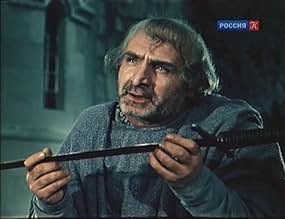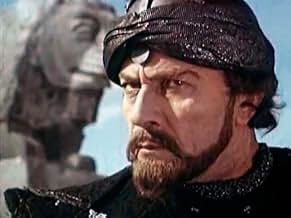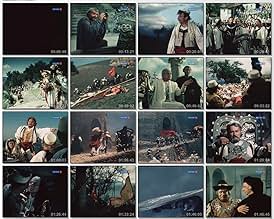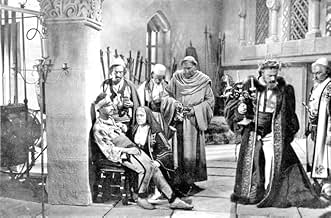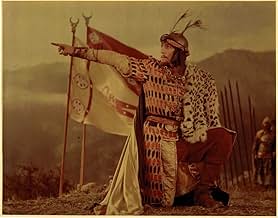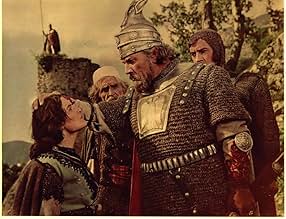VALUTAZIONE IMDb
7,7/10
832
LA TUA VALUTAZIONE
La vera storia dell'Eroe Nazionale degli Albanesi, George Kastrioti Scanderbeg, dalla sua nascita nel 1405, alla sua morte nel 1468.La vera storia dell'Eroe Nazionale degli Albanesi, George Kastrioti Scanderbeg, dalla sua nascita nel 1405, alla sua morte nel 1468.La vera storia dell'Eroe Nazionale degli Albanesi, George Kastrioti Scanderbeg, dalla sua nascita nel 1405, alla sua morte nel 1468.
- Regia
- Sceneggiatura
- Star
- Premi
- 2 vittorie e 1 candidatura in totale
Veriko Anjaparidze
- Dafina
- (as Veriko Andjaparidze)
Recensioni in evidenza
I have recently returned from a visit to Albania; just about everywhere I went I heard about the national hero Skanderbeg, who was King of Albania during a brief period of independence in the fifteenth century. The reason he is regarded as a national hero is because he fought valiantly to preserve the country's independence against the invading Ottoman Turks; he was successful in the short term, but the country was eventually conquered not long after his death in 1468. Although he was a Christian who was fighting against Muslims to keep Albania a Christian country, he is today, ironically, revered by Albania's Muslim majority as well as its Christian minority.
Indeed, he was even revered by the militantly atheistical regime of the country's Communist dictator, Enver Hoxha. This film was made in 1953, during the Communist era, as a Soviet-Albanian coproduction, although the Soviet contribution was the greater, unsurprisingly given the small size of Albania and its economy. Most of the film was a shot in the Soviet Union by a Russian director, Sergei Yutkevich and it was made in Russian using Soviet (but not necessarily ethnically Russian) actors; Skanderbeg himself is played by a Georgian, Akaki Khorava. The film was then dubbed for showing in Albania; it was this Albanian-language version which I recently came across on YouTube.
As a child, the young George Kastrioti (Skanderbeg's real name) is sent as a hostage to the court of the Ottoman Sultan, where he raised as a Muslim and becomes a warrior in the Sultan's army. His love for his homeland, however, impels him to return to Albania where he puts himself at the head of the nationalist cause and leads his people in their struggle for freedom.
The film was recommended to me by our guide in Albania, who described it as the Communist bloc's answer to Western films such as "Spartacus" and "The 300 Spartans". In fact, both those films were made a few years after "The Great Warrior Skanderbeg", although in its grand visual style it has something in common with earlier Hollywood epics such as "Samson and Delilah" or "Quo Vadis?"
Although it was made during the Communist period, it is not notably Communist in its themes; there is, for example, no attempt to portray Skanderbeg as a proto-socialist. It is about patriotism and national struggles rather than about class struggles, with the Albanians (apart from a few pro-Turkish traitors) heroic and the Turks bloodthirsty villains. The way in which various other nationalities are portrayed, however, may owe something to Cold War rivalries. The villains, apart from the Turks, are the Serbs and the Venetians, shown as treacherous and unreliable allies of the Albanians, whereas their true friends are the Poles and Hungarians. In 1953, of course, Italy, like Turkey, was a member of NATO and Tito's Yugoslavia, although officially Communist, was despised by Hoxha's regime as "revisionist". Poland and Hungary, however, were Albania's allies in the Warsaw Pact. After Albania broke away from the Soviet Bloc in 1960, the film continued to be shown, but now it had a different meaning. Skanderbeg became a symbol of gallant little Albania standing alone against a hostile world.
Trying to evaluate the film is a difficult task for a non-Albanian. On the one hand, it is often grand and stirring. On the other, it can at times seem static and the acting does not always seem inspired, although this may be due to the fact that I was watching it in a dubbed version. I always, however, found it worth watching of the insights it affords into another nation's culture and history. 7/10.
Indeed, he was even revered by the militantly atheistical regime of the country's Communist dictator, Enver Hoxha. This film was made in 1953, during the Communist era, as a Soviet-Albanian coproduction, although the Soviet contribution was the greater, unsurprisingly given the small size of Albania and its economy. Most of the film was a shot in the Soviet Union by a Russian director, Sergei Yutkevich and it was made in Russian using Soviet (but not necessarily ethnically Russian) actors; Skanderbeg himself is played by a Georgian, Akaki Khorava. The film was then dubbed for showing in Albania; it was this Albanian-language version which I recently came across on YouTube.
As a child, the young George Kastrioti (Skanderbeg's real name) is sent as a hostage to the court of the Ottoman Sultan, where he raised as a Muslim and becomes a warrior in the Sultan's army. His love for his homeland, however, impels him to return to Albania where he puts himself at the head of the nationalist cause and leads his people in their struggle for freedom.
The film was recommended to me by our guide in Albania, who described it as the Communist bloc's answer to Western films such as "Spartacus" and "The 300 Spartans". In fact, both those films were made a few years after "The Great Warrior Skanderbeg", although in its grand visual style it has something in common with earlier Hollywood epics such as "Samson and Delilah" or "Quo Vadis?"
Although it was made during the Communist period, it is not notably Communist in its themes; there is, for example, no attempt to portray Skanderbeg as a proto-socialist. It is about patriotism and national struggles rather than about class struggles, with the Albanians (apart from a few pro-Turkish traitors) heroic and the Turks bloodthirsty villains. The way in which various other nationalities are portrayed, however, may owe something to Cold War rivalries. The villains, apart from the Turks, are the Serbs and the Venetians, shown as treacherous and unreliable allies of the Albanians, whereas their true friends are the Poles and Hungarians. In 1953, of course, Italy, like Turkey, was a member of NATO and Tito's Yugoslavia, although officially Communist, was despised by Hoxha's regime as "revisionist". Poland and Hungary, however, were Albania's allies in the Warsaw Pact. After Albania broke away from the Soviet Bloc in 1960, the film continued to be shown, but now it had a different meaning. Skanderbeg became a symbol of gallant little Albania standing alone against a hostile world.
Trying to evaluate the film is a difficult task for a non-Albanian. On the one hand, it is often grand and stirring. On the other, it can at times seem static and the acting does not always seem inspired, although this may be due to the fact that I was watching it in a dubbed version. I always, however, found it worth watching of the insights it affords into another nation's culture and history. 7/10.
One of the most beautiful old movies with national heroes. The true story of Skanderbeg who stopped the Ottomans from crossing into Europe for more than 25 years. A beautifully made film for the time and great soundtracks.
This movie is a great one. Unlike "Troy" or "Alexander" this one has its own goods. There are the scene fights, small love lines, and magic if you ask me. This historic movie about the Albanian hero "Skenderbeu" is what a family movie should be about. Is educational and not very violent, and as far as my opinion I think of it as a PG-13 movie. Would be great if Hollywood creates a version of this movie, I, my self believe it wold be great to experience something with the great technology at hand now and compare it with the 1970's version of this movie. There is anything about this movie that all the other movies should have, meaning. There is clearly a very good history line behind this movie. Starting in the beginning with a abduction of the Albanian brethren to the day when "Skenderbeu" betrays the Turks and gets back to its place, Albania.
10dermaku
i already watch this movie more than three times and every time i watch it in the end i was always thinking the same thing wow this movie is fantastic i like this true history like the middle age war and the strategy that is used in this period of time is fantastic Albania is proud to have soldier like Gjergj Kastrioti and plenty plenty great soldier and bed thing about it is because movie is too old and need a remake to be even better to know this generation what a great warrior use to be Gjergj Kastriot a.k.a Skenderbeg, glad to watch this movie from 1953 such a grateful and strong history from great name and soldier it will be even better if we see soon the new movie with the same history
The movie tells about the legendary almost mythical exploits of George Castriot Scanderbeg against one of the most ruthless and greatest empires of the world, the Ottoman Empire. I gave this movie a 7 however because it does not portray Scanderbeg's true image. He was not a mountain dweller rather he was a Prince of very noble blood, and it said in the chronichles of the Musachi Princes and in the biography of Jacques Lavardine that Scanderbeg's family could trace back it's roots up to 30 generations, and that they were directly tied to the legendary Phyrrus King of Epirus descendant of the Achilles the Epirotan, and from there stems the powerful race of the Epirotans a semi pelasgian-illyrian tribe. This background is not in the movie, partly because those information came only in the last 20 years, which makes me wonder when will Hollywood write a script about the true story of what can be called the last warrior king and erudite in the same fashion as the Arthurian legends(only this one we know for sure to be real) and many other valorous comandants of the history of mankind.
We had Troy, Alexander and even Hercules, now it's time to write about the great Scanderbeg and how he saved Europe from the Ottoman threat by fighting with them alone(with minor support from the Pope) for more then 25 years.
This is a must see movie, I don't know if they have managed to put subscripts, but the music is certainly amazing, and considering hat this was done with the help of the russians because albania was too poor to afford such a movie I think that overall for the time, for the knowledge we had about Scanderbeg, or I should say the widespread common knowledge that we had about him, this is truly a remarkable movie with it's artistic elements.
The guy who plays Scanderbeg is also the best match they could find. I'm sure the counterpart of him would be Russell Crow today.
We had Troy, Alexander and even Hercules, now it's time to write about the great Scanderbeg and how he saved Europe from the Ottoman threat by fighting with them alone(with minor support from the Pope) for more then 25 years.
This is a must see movie, I don't know if they have managed to put subscripts, but the music is certainly amazing, and considering hat this was done with the help of the russians because albania was too poor to afford such a movie I think that overall for the time, for the knowledge we had about Scanderbeg, or I should say the widespread common knowledge that we had about him, this is truly a remarkable movie with it's artistic elements.
The guy who plays Scanderbeg is also the best match they could find. I'm sure the counterpart of him would be Russell Crow today.
Lo sapevi?
- QuizThe film was remastered in 2012 for Albania's 100th anniversary for independence.
I più visti
Accedi per valutare e creare un elenco di titoli salvati per ottenere consigli personalizzati
- How long is Skanderbeg?Powered by Alexa
Dettagli
- Tempo di esecuzione
- 1h 35min(95 min)
- Mix di suoni
- Proporzioni
- 1.37 : 1
Contribuisci a questa pagina
Suggerisci una modifica o aggiungi i contenuti mancanti

